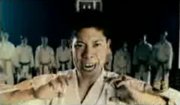While reading another martial arts blog, I encountered this advice on the use of anger:
You have to be aggressive and attack your opponent, attacking them will make them block more and hence stop their attacks… So how do you become aggressive, if it’s just not in your nature? It’s all about how you process the situation, psychologically. Start thinking “I’m not going to let them do this to me. Fcuk them!”. You have to get mad.
I believe that, if you practice martial arts for personal development, rushing to rage is a counterproductive strategy. And truthfully, anger isn’t all that useful for fighting either.
Practical Applications of Anger
The emotion of anger appears in different forms and to different degrees. To clarify, I am referring to wrath and fury, not to mere annoyance or acrimony. And I certainly am not referring to passion and determination, which some people classify as anger for reasons unknown to me.
Anger can be used in individual combat to intimidate an opponent. By assuming a terrible demeanor, you may prompt your opponent to make a fearful retreat. Consider this a charitable alternative to destroying your opponent’s body.
Attempts at intimidation will not succeed against every opponent. They are likely to work only on those who are physically and mentally weaker than you. Opponents who know they are stronger, or who believe they are stronger, will not be cowed by these psychological tricks.

Anger will prevent you from fully employing your hard-earned skills. Timing, precision, coordination and sensitivity decrease during emotional peaks. If you are fast and strong, this may not be a problem; if not, you will be left with no means to defend yourself.
With a loss in sensitivity comes an increased tolerance for pain. This is deceptively appealing, and very dangerous: if you don’t feel the pain, you won’t avoid the damage that often follows it. Pain is a gift; accept it graciously.
Alternatives to Anger
Anger, fear and anxiety are natural human responses to stress. Fighting is stressful because the risks are significant and the outcome is unknown.
As you build familiarity and skill in martial arts, unknowns become knowns, and you gain control over the outcome of conflict.
As you clarify and shape the probable outcome of conflict, your stress decreases.
As your stress is reduced, emotional extremes become superfluous and will subside.
These are natural processes that manifest in authentic study of martial arts. Through practice, you can reach emotional equilibrium and greater levels of self-control.
The items that any court is led to accept as fact do have long-term consequences and the attacker has already planned out the tactical advantages along with how a court of law will perceive the situation. Those material arrangements and cultural arrangements will not be important to any court of law, instead the courts will look at whatever the judge will call right.
That attacker or group of attackers will know how the judge is likely to rule and will arrange the situation so a judge will rule in their favor. This next item is the environment will be chosen so the audience to this arranged situation are likely to choose the side of the attacker or attackers, as in the crowd helping the attacker because his fellow attackers are helping that attacker. The World is more cruel than any duelist will want to admit, with some situations not even attempting to put up an imitation fairness.
There are situations that do exist where pain will lead to responses favoring the group of attackers along with physical exhaustion favoring the group of attackers. The act of living through an attack can be for enhanced personal suffering and misery to the people around oneself, those vicious people will eventually suffer the fruits of their labor yet the short-sighted which only perceive what’s presently happening will only notice violence in the present being received by them.
Interesting article. Many people come to martial arts because they are angry and frustrated, sometimes the result of bullying, attacked on the street etc.
To walk around perpetually tense and angry is going to attract anger in others, and will damage health on the long run. But there is a massive build up of energy in anger, which is why it is so ‘addictive.’ Is it wrong to learn how to use and harness this energy? To only use it when it is absolutely necessary? What is anger but an intense need to take action in the face of injustice?